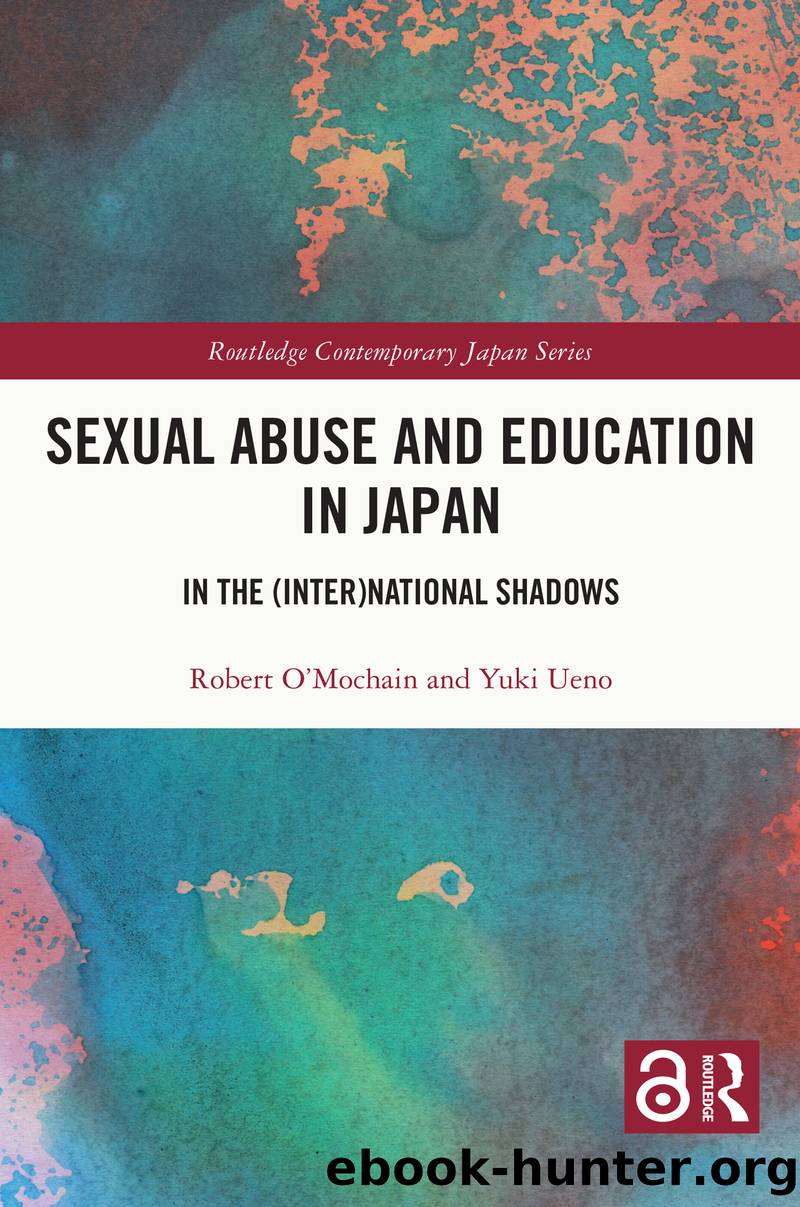Sexual Abuse and Education in Japan by Robert O'Mochain & Yuki Ueno

Author:Robert O'Mochain & Yuki Ueno [O’Mochain, Robert & Ueno, Yuki]
Language: eng
Format: epub
ISBN: 9781000648201
Publisher: Taylor and Francis
Published: 2022-08-15T00:00:00+00:00
Japanâs self-image shadowed by male hysterical subjectivity
Mikanagi (2011) notes that over the course of Japanese history since the foundation of the state, one constant theme can be discerned: a preoccupation with the countryâs hierarchical position on the international stage. The extent to which this preoccupation is affecting contemporary gender relations seems worthy of closer examination. Speeches and comments from Prime Ministers and Foreign Ministers from the 1890s right up to the early twenty-first century illustrate a preoccupation with the objective of achieving equal status with Western powers. There is a determination, especially among the more conservative political factions, for Japan to gain a more pre-eminent place on the world stage, as would be demonstrated, for example, by a permanent seat on the UN Security Council. To achieve this goal, it would be necessary for Japan to be able to provide soldiers to fight in UN military intervention campaigns. However, countries such as South Korea and China, which bore the brunt of Japanese belligerence during the Asia-Pacific War, have expressed deep concern about the possibility of Japanese soldiers going to other countries to engage in military campaigns. They fear, perhaps, that militarists in the shadows would extend the supposedly peaceful purpose to achieve more nefarious objectives, as was the case in Manchuria in the early 1930s with the inauguration of the puppet Manchuko state. Drawing attention to disputes about historical crimes, such as âcomfort womenâ atrocities, will hamper efforts to gain sufficient trust from foreign nations to allow Japanese soldiers to fight abroad. Thus, the resistance against comprehensive admittance of wrongdoing regarding âcomfort womenâ will likely remain intense as will the antipathy toward women who are associated with âcomfort womenâ albeit in shadowy or ambiguous terms. Zarakol (2010) notes that Japan could gain much on the international stage if it were to take responsibility for historical crimes and to educate young people about wartime atrocities, such as the sexual slavery involved in the âcomfort womenâ system. The reluctance to take full responsibility remains puzzling. She accounts for this reluctance, ultimately, in the shame that Japan was forced to experience when it was labeled as an âuncivilizedâ nation upon initial entry into international society during the late 1800s. Still today, retractions of apologies to âcomfort womenâ are rooted in attempts to achieve âontological securityâ by rejecting Western societyâs negative labeling of Japanese identity (p. 20).
The relationship with the other is vital in the formation of a sense of national identity â as Oguma (2002) asserts regarding the Japanese historical context, âThe discourse on the self-image of the Japanese in modern Japan was inseparable from the discourses on the West and on various Asian countries and on the minorities within Japan herselfâ (xviii) â and the anxiety that is induced by the perceived lack of recognition from the other may be intense. In more recent history, events surrounding the first Gulf War in 1990â1991 may constitute an example of male hysteria in the Japanese context. In March 1991, the Kuwaiti government took out
Download
This site does not store any files on its server. We only index and link to content provided by other sites. Please contact the content providers to delete copyright contents if any and email us, we'll remove relevant links or contents immediately.
Nudge - Improving Decisions about Health, Wealth, and Happiness by Thaler Sunstein(7692)
The Fire Next Time by James Baldwin(5431)
iGen by Jean M. Twenge(5408)
Adulting by Kelly Williams Brown(4565)
The Sports Rules Book by Human Kinetics(4379)
The Hacking of the American Mind by Robert H. Lustig(4375)
The Ethical Slut by Janet W. Hardy(4242)
Captivate by Vanessa Van Edwards(3838)
Mummy Knew by Lisa James(3686)
In a Sunburned Country by Bill Bryson(3537)
The Worm at the Core by Sheldon Solomon(3486)
Ants Among Elephants by Sujatha Gidla(3460)
The 48 laws of power by Robert Greene & Joost Elffers(3247)
Suicide: A Study in Sociology by Emile Durkheim(3018)
The Slow Fix: Solve Problems, Work Smarter, and Live Better In a World Addicted to Speed by Carl Honore(3007)
The Tipping Point by Malcolm Gladwell(2914)
Humans of New York by Brandon Stanton(2868)
Handbook of Forensic Sociology and Psychology by Stephen J. Morewitz & Mark L. Goldstein(2699)
The Happy Hooker by Xaviera Hollander(2686)
